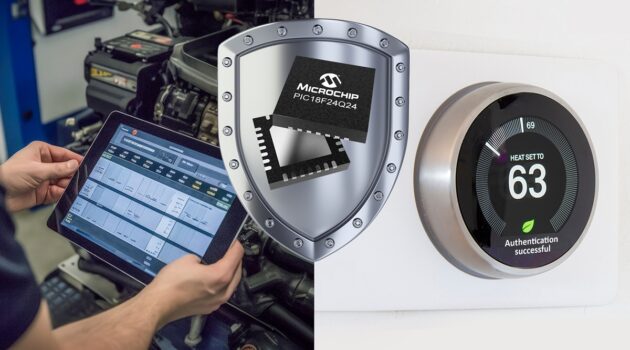More and more everyday items are connected to the cloud—from cellphones and vehicles to smart thermostats and home appliances. With this rise in connectivity, the need for advanced security measures at the chip level, protecting both firmware and data, is critical. To defend against current and ever-expanding security threats, Microchip Technology (Nasdaq: MCHP) has launched the PIC18-Q24 Family of Microcontrollers (MCUs).
To counter the threat of maliciously reprogramming a device in an embedded system, PIC18-Q24 MCUs introduce the Programming and Debugging Interface Disable (PDID) feature. When enabled, this enhanced code protection feature is designed to lock out access to the programming/debugging interface and block unauthorized attempts to read, modify or erase firmware.
“System security is only as strong as its weakest link. Any programmable component can be vulnerable, and it is essential to implement enhanced protection features to prevent potential hacks,” said Greg Robinson, corporate vice president of Microchip’s 8-bit MCU business unit. “The PIC18-Q24 family of MCUs from Microchip are designed with advanced security in the forefront, to help customers combat threats at the system’s foundation.”
Because many secure systems often connect and communicate with a wide variety of sensors, memory chips and processors, the PIC18-Q24 MCUs feature Multi-Voltage I/O (MVIO). This feature eliminates the need for external level shifters and allows the MCUs to interface with digital inputs or outputs at different operating voltages. In addition to reducing board complexity and Bill of Material (BOM) cost, MVIO makes PIC18-Q24 MCUs especially well-suited as system management processors, performing monitoring and telemetry for a larger processor. These seemingly routine tasks are typically most vulnerable to potential hackers as they try to gain access to embedded systems.
The PIC18-Q24 family is also enabled with the option to have an immutable bootloader for applications that want a secure way to upgrade firmware. To learn more, visit Microchip’s PIC® MCU webpage.
Development Tools
PIC18-Q24 MCUs are fully supported by Microchip’s comprehensive development ecosystem and designed to integrate with the MPLAB® Code Configurator (MCC). The PIC18F56Q24 Curiosity Nano Evaluation Kit (EV01E86A) offers complete support for designing with the PIC18-Q24 family. These features coordinate for a seamless embedded development experience and reduced time to market.
Pricing and Availability
For additional information and to purchase, contact a Microchip sales representative, authorized worldwide distributor or visit Microchip’s Purchasing and Client Services website, www.microchipdirect.com.
About Microchip Technology:
Microchip Technology Inc. is a leading provider of smart, connected and secure embedded control solutions. Its easy-to-use development tools and comprehensive product portfolio enable customers to create optimal designs which reduce risk while lowering total system cost and time to market. The company’s solutions serve more than 125,000 customers across the industrial, automotive, consumer, aerospace and defense, communications and computing markets. Headquartered in Chandler, Arizona, Microchip offers outstanding technical support along with dependable delivery and quality. For more information, visit the Microchip website at www.microchip.com.
Disclaimers and Notices
Performance varies by use, configuration and other factors. No product or component can be absolutely secure. Your costs and results may vary.
Statements in this document that refer to future plans or expectations are forward-looking statements. These statements are based on current expectations and involve many risks and uncertainties that could cause actual results to differ materially from those expressed or implied in such statements. For more information on the factors that could cause actual results to differ materially, see our most recent earnings release and SEC filings at www.microchip.com.
The Microchip name and logo, the Microchip logo, MPLAB and PIC are registered trademarks of Microchip Technology Incorporated in the U.S.A. All other trademarks mentioned herein are the property of their respective companies.
